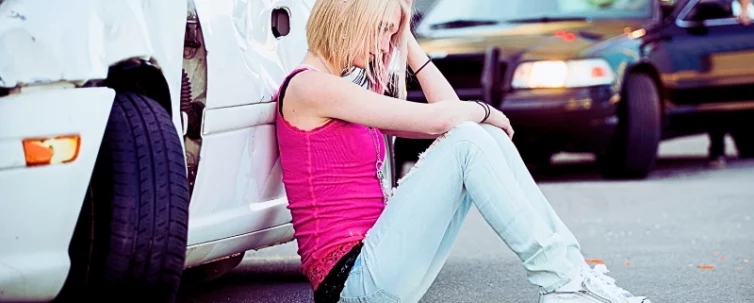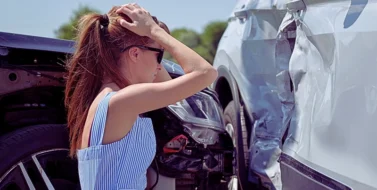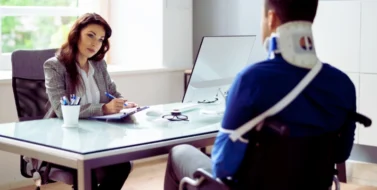Does insurance pay for hit-and-run accidents? Insurance may cover hit-and-run accidents when you have the right coverage, such as collision coverage, uninsured motorist coverage, and medical payments coverage. These accidents are particularly distressing because the responsible party leaves the scene, forcing you to rely on your own insurance for assistance.

If you’ve been injured in a hit-and-run, contact Lloyd Miller Law Group at 773-838-8100 to explore your legal options and seek compensation.
Table of Contents
Understanding Insurance Coverage for Hit-and-Run Accidents in Chicago
In Illinois, your auto insurance could cover a hit-and-run incident, within the limits of your policy. If the other driver is not identified, you must depend on your uninsured motorist coverage limits. Additionally, collision coverage and MedPay add-ons can offer financial compensation.
What Is Considered a Hit-and-Run Accident in Chicago?
A hit-and-run accident occurs when a driver involved in a collision leaves the scene without providing assistance or exchanging information. Drivers may flee for various reasons, such as having a suspended or expired license, lacking insurance, driving illegally, or fearing legal repercussions, fearing you will sue a drunk driver, or outstanding warrants. In some cases, they may also be genuinely afraid for their safety. Regardless of the reason, the key issue remains that they abandoned the scene of the accident. If caught, they can be found liable for a hit-and-run accident, facing consequences.
Under Illinois law, drivers involved in accidents that result in bodily injury or property damage must fulfill five obligations. A hit-and-run incident in Chicago occurs when a driver departs the scene without taking one of these five actions:
- Stop: It is mandatory for drivers to stop at the scene of an accident, including single-vehicle accidents that only damage property. Simply driving away is not allowed.
- Check for Injuries: Drivers must ensure that everyone involved in the accident is okay. If anyone requires medical assistance, you are obliged to help by seeking medical care.
- Exchange Information: All drivers are required to exchange their names and addresses with each other and with responding police officers. Failing to provide this information, even after stopping, constitutes a hit-and-run.
- Show Driver’s License: Drivers need to present their driver’s licenses to verify their identity and confirm their legal eligibility to drive.
- Offer Assistance: In addition, drivers must offer help to anyone who has been injured in the accident.
In 2022, the United States recorded 2,932 fatalities resulting from hit-and-run incidents, marking a 0.5% increase compared to the previous year.
Options After a Hit-and-Run Accident
Victims of hit-and-run accidents in Chicago have the right to call the police after a car accident, file a claim through their insurance, and work with police to identify the fleeing driver. If you can identify the suspect, you can also sue them.
You can hire a personal injury lawyer to help you find the at-fault party and navigate interactions with law enforcement and insurance companies. However, identifying the responsible driver is a challenge, as only 10% of hit-and-run drivers are caught, and many face no criminal charges. Your legal options depend on the success of the search, summarized as follows:
If the Driver Is Found
You have the option to file a claim with their insurance company and pursue a personal injury lawsuit to secure a settlement that accurately represents your losses.
If the Driver Isn’t Found
You can file a claim with your insurance company under your uninsured motorist coverage. In Illinois, all drivers are required to have this coverage, which also applies if you are involved in a hit-and-run incident.
There is a statute of limitations. You have two years from the date of your accident to submit a claim, so it’s best to contact a personal injury lawyer in Chicago as soon as you can.
Hit-and-Run Insurance Coverage
You might not be able to find the driver who left the scene, even with law enforcement’s help. However, in Illinois, your insurance policy might offer coverage for a hit-and-run accident in various ways:
Collision
Collision coverage is a key part of your insurance policy, as it can cover the expenses for repairing or replacing your vehicle if it’s damaged or deemed a total loss in an accident. You’ll be responsible for paying any deductible amount yourself.
Uninsured Motorist (UM) Coverage
Will uninsured motorist coverage apply to a hit-and-run? Uninsured motorist (UM) coverage is designed to protect you and your passengers in the event of an accident where the other driver cannot be identified or is uninsured. Uninsured motorist coverage will apply to a hit-and-run. With this coverage, your insurance provider will take care of various costs related to the accident. This includes medical expenses, which cover hospital stays, surgeries, medications, and other essential treatments. It also addresses lost wages, helping to replace the income you might lose due to the accident. Additionally, UM coverage provides financial assistance for pain and suffering, which accounts for both physical and emotional distress.
The extent of coverage and limits of your policy depend on the terms of your policy. In Illinois, there is a minimum requirement of $25,000 per person and $50,000 per accident for uninsured motorist coverage. However, if your property and medical expenses exceed these limits, you will need to pay the additional costs out of pocket.
Medical Payments
In Illinois, a medical payments policy can cover the medical expenses for you and your passengers, up to the limits of the policy. This can be beneficial if you’re unable to obtain the other driver’s insurance information.
Does Your Policy Cover Hit-and-Run Incidents in Chicago?
In Illinois, it is mandatory to have liability and property damage insurance to cover injuries you may cause to others or damages to their vehicles in the event of a car accident. These insurance policies are not intended to cover repairs to your own vehicle or your personal medical expenses.
Additionally, there is a requirement for uninsured motorist insurance. This provides financial protection if you are in an accident where the other driver is at fault but does not have insurance. Uninsured motorist coverage compensates you as if the other driver had liability insurance and is considered a first-party claim, which means you will file it with your own insurance company.
In Illinois, uninsured motorist coverage is required, and the minimum limits are the same as those for liability insurance. You must have coverage of at least $20,000 for individual injuries per accident, and $50,000 for injuries to two or more people in a single accident. Although you are not required to have property damage coverage, your insurance provider might offer it as an option, usually at a higher monthly premium.
Uninsured motorist coverage applies in the following situations:
- When the driver at fault is responsible for the accident, and
- When the owner or driver of the other vehicle either lacks insurance or cannot be identified, such as in a hit-and-run situation.
Are Your Policy Limits Sufficient?
Your insurance should provide coverage for hit-and-run incidents in Chicago. However, it will only cover these incidents up to the limits of your policy, which may not be adequate for severe accidents. Here are some reasons to consider raising your uninsured motorist coverage limits:
Serious Injuries
Medical costs for severe injuries, like spinal cord or traumatic brain injuries, can quickly surpass minimum coverage levels.
Income Loss
Prolonged recovery times or permanent disabilities can lead to substantial financial losses.
Reassurance
Higher UM limits offer additional protection in case of accidents involving hit-and-run or uninsured drivers.
When to Seek Help from a Chicago Accident Attorney
It is always valuable to seek help from a Chicago accident attorney following a hit-and-run incident. There are numerous advantages to working with a car accident attorney, one of which is their ability to evaluate your situation and identify your options. Most individuals have at least one pathway to pursue compensation after a hit-and-run. Your attorney and their team can consider state and local regulations, the available information about the at-fault driver, your hit-and-run insurance coverage in Chicago, and several other factors to guide your next steps.
If you file an uninsured motorist claim, you must prove the other driver caused the accident by gathering evidence and building a strong case. Uninsured motorist claims can be quite complex, particularly when insurance companies challenge the severity of your injuries or try to reduce your compensation. A knowledgeable personal injury lawyer can:
Analyze Your Case
Evaluate the worth of your damages, such as medical bills, lost income, and emotional distress.
Negotiate With Insurers
Represent you to ensure you receive just compensation.
Manage Disputes
If your claim is rejected or undervalued, your attorney can seek arbitration or litigation to resolve the issue.
Collect Evidence
Gather the necessary documents, including police reports, medical records, and witness testimonies, to bolster your claim.
Having legal representation increases your likelihood of successfully obtaining compensation. If you need help with filing an uninsured motorist claim after a hit-and-run, contact us at Lloyd Miller Law Group.





